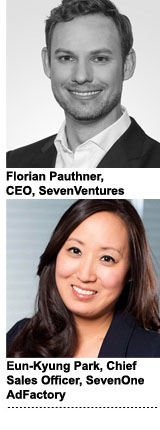
While broadcaster ProSieben owns about a 30% share of the German TV market, it’s looking to expand its influence in new channels – using its investment arm, SevenVentures, to scout startups.
“We look to invest into promising startups on the B2C side of the business, which is different than the investment we make into our strategic, core business with all of our TV channels,” said Florian Pauthner, CEO of SevenVentures.
Since SevenVentures’ debut in 2009, it’s invested in startups like mobile shopping app Shopkick and subscription etailer JustFab.
Startups get access to ProSieben’s regional expertise, like Shopkick did when ProSieben connected it with advertising spots on its German TV stations and with German retailers.
But ProSieben gets a lot of benefits as well. It’s easy to see why major media houses (Disney also has a digital accelerator) are so keen to invest – startups provide access to new verticals, from fitness and nutrition to ecommerce.
“We invest in a wide range of businesses that would be attractive to an end consumer to gather a lot of know-how and knowledge to apply to our own assets,” Pauthner said.
ProSieben’s production arm, Red Arrow, for instance, acquired a 20% stake in a Los Angeles-based production company specializing in digital content.
These investments provide an inroad to creating Amazon originals – giving ProSieben’s production arm access to greater US market share, said Eun-Kyung Park, the chief sales officer for ProSieben’s creative and content agency, SevenOne Ad Factory.
On ProSieben’s current agenda is bringing programmatic techniques into content production.
“Right now we’re working with our startups and studios to do more contextual advertising [or product placement] using data,” Park said. “We can show advertising that’s much more fascinating if it’s technology-based.”
For instance, ProSieben invested in a digital out-of-home company to expand cross-channel marketing into offline and mobile.
“It’s not to say TV is old or our focus is now digital, but we try to connect the two to really accelerate our existing model,” Park said. “This is why we’re growing a content team, so we understand the creative. The more creative you have, it gets more efficient for the customer, but more expensive for us.”
And do ProSieben’s minority investments in content companies ultimately lead to acquisition? In some cases – as with ProSieben’s stake in YouTube MCN Collective Digital Studios (now Studio71) – they do.
“At any stage, we could acquire a majority of a company,” said Pauthner. “But we tend to enter through a minority [or] equity investment.”
This post was syndicated from Ad Exchanger.

More Stories
L’Oréal partners with WPP for influencer growth
Warner Bros. Discovery CEO David Zaslav Receives $51.9 Million Pay Package for 2024
TikTok Fave Duolingo Boosts YouTube Shorts Viewership 430% in One Year